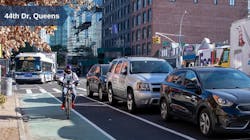New NY laws to fund ‘complete streets’ projects; require transit dependent representation on agency boards
Two pieces of legislation in New York state gained Gov. Kathy Hochul’s signature to move them into law. The bills support municipal “complete streets” projects and require regional transportation boards in upstate and western New York to have voting seats for transit dependent individuals.
"Whether you're on the sidewalk, in the bike lane or riding the bus, you deserve a high-quality trip that gets you safely to your destination," Gov. Hochul said. "Transportation is all about connections: Bringing people closer to their jobs, their homes and the people they love. I'm proud to sign two new laws that will make our streets safer and our communities more connected."
Complete streets
Legislation (S.3897/A.8936-A) will increase funding and support a holistic approach to street design through "complete streets" projects. These projects are roadways planned and designed to consider the safe, convenient access and mobility of roadway users of all ages and abilities. This includes pedestrians, bicyclists, public transportation riders and motorists.
The governor’s office says complete street designs contribute to a cleaner, greener transportation system. This bill increases the state share of funding for municipalities incorporating complete street features. Under the new legislation, the state's contribution to the non-federally funded portion of complete street projects will increase to 87.5 percent, which will help municipalities to implement these street designs.
“With pedestrian deaths in the United States hitting a 40-year high as noted by the Governor's Highway Safety Administration, New Yorkers are at continued risk of injury or death due to traffic violence on our roads today more than ever before,” said New York Assemblymember Patricia Fahy. “I sincerely thank Gov. Hochul for signing the Complete Streets Funding bill (A.8936/S.3897), which will serve to protect more pedestrians and cyclists by increasing state funding for local complete street projects like sidewalks, crosswalks, curb cuts and other pedestrian-friendly infrastructure, undoubtedly saving lives and making streets more user-friendly for all. This law will empower local governments to pursue more of these projects by reducing their cost burden and increasing the state's share of funding for these projects. If our goal is to build strong, multi-modal walkable communities while reducing transportation-sector emissions, complete street design is a proven component for achieving that objective.”
Transit board representation
Upstate and western New York transit authorities will be required to have a transit dependent representative hold a voting position on the authority’s board of directors. The law defines transit dependent as “an individual who is limited to public transit as their primary mode of transportation because the individual has either a permanent or temporary disability.”
This law will impact Rochester-Genesee Regional Transportation Authority, Capital District Transportation Authority, Central New York Regional Transportation Authority and the Niagara Frontier Transportation Authority.
"In a region like ours, in which transportation is mostly focused on personal car ownership, it is imperative we craft long-term solutions for those who remain unable to drive. Many of the decisions regarding the re-routing and terminating of bus services, and the increasing of rates, have been made without input or representation from those directly affected. This bill will give a voice to the disabled community by allowing them a direct say in all matters related to our region's public transportation progress,” said New York Assemblymember Jonathan D. Rivera.
Mass Transit Staff Report
Stories under this byline were produced through a team effort by the editorial staff of Mass Transit.
To learn more about our team, click here.
If you have a story idea, let us know by emailing [email protected]. Please review our contributor guidelines found here.


